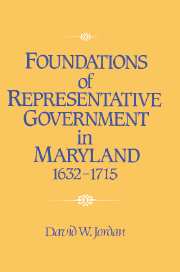Book contents
- Frontmatter
- Contents
- Acknowledgments
- Introduction: “For the Good and Happy Government” of Maryland
- Part I “In the Infancy of This Plantation”: 1632–1660
- Part II “Lord Baltimore's Politick Maximes”: 1660–1689
- 3 “For the Most Part Good Ordinary Householders”
- 4 “To Liken Us to a Conquered People”
- Part III “Wee Your Majesties Most Humble and Loyall Subjects”: 1689–1715
- Epilogue: “Our Present Happy Protestant Constitution”
- Appendixes
- A Note on the Sources
- Index
3 - “For the Most Part Good Ordinary Householders”
Published online by Cambridge University Press: 14 September 2009
- Frontmatter
- Contents
- Acknowledgments
- Introduction: “For the Good and Happy Government” of Maryland
- Part I “In the Infancy of This Plantation”: 1632–1660
- Part II “Lord Baltimore's Politick Maximes”: 1660–1689
- 3 “For the Most Part Good Ordinary Householders”
- 4 “To Liken Us to a Conquered People”
- Part III “Wee Your Majesties Most Humble and Loyall Subjects”: 1689–1715
- Epilogue: “Our Present Happy Protestant Constitution”
- Appendixes
- A Note on the Sources
- Index
Summary
Once every year within this Province is an Assembly called, and out of every respective County (by the consent of the people) there is chosen a number of men, and to them is deliver'd up the Grievances of the Country; and they maturely debate the matters, and according to their Consciences make Laws for the general good of the people; and where any former law that was made, seems and is prejudicial to the good or quietness of the Land, it is repeal'd. These men that determine on these matters for the Republique, are called Burgesses, and they commonly sit in Junto about six weeks, being for the most part good ordinary Householders of the several Counties, which do more by a plain and honest Conscience, than by artificial Syllogisms drest up in gilded orations.
George Alsop, “A Character of the Province of Maryland,” 1666Now when any thing in the Popish chamber is hatched that must have a Country cloack, warrants issue forth to every County to choose 4. men… These are called Deligates, but the Country calls them Delicats, for thy gladly com to sutch Christenings at St. Marys, where there is good cheere made, and the poore Country payes every time, one two or more hundred thousand pounds of tobacco for it. For there is many Items: and item for chancellors fees; item for secretary fees etc: and the more Assemblies the oftener it goes about, all dae thy nothing els, but argument fees uppon fees, and continue temperary lawes as thy call them … this thy call Acts of Assembly, but the Country calls them, dissemblings, and abreptive procured acts.
“Complaint from Heaven with a Huy and crye,” 1676- Type
- Chapter
- Information
- Publisher: Cambridge University PressPrint publication year: 1988



